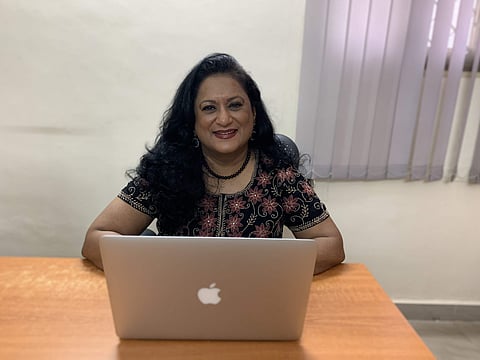

After having lived life as an active, vibrant and fun-loving person who lived each day to the fullest, it was a surprise when one day, at the age of 26, Pramila Mathew developed double vision. The doctors were puzzled. Different parts of her body started to get affected and by the age of 40, she was even having difficulty breathing. She was informed that she has a neurological disease called Multiple Sclerosis and worse yet, that it was progressive in nature, so the deterioration would continue. When Pramila first heard this news, it devastated her life. But amidst all this, she realised that at some deep level, she was somehow responsible for her own destiny.
So at 26, she left India to go to the US for her higher education. She excelled scholastically as she had done earlier in life. She did her master's and extensive post-master's work in Counselling Psychology and soon, landed her first job counselling underprivileged teenagers. "I absolutely loved it. For the first time in my life, I came face to face with the indescribable tenacity and persistence that these beaten and broken down children displayed in their lives. It was like I was being prepared for the years and events in my life that were yet to come," she says.
Pramila worked as a counsellor for nine years and the last five years was in private practice. This is when she had her first experience with what is known today as Executive Coaching. People in significant positions in organisations were reaching out to her to help them enhance their performance and manage people more efficiently. "I knew that my understanding of the human psyche clubbed together with my knowledge of the workings of the business world would be a powerful combination for an Executive Coach. So, I wanted to do my MBA as this would give me a good comprehension of business. But what I did not realise then was that, more powerful than my education and work experience, would be the lessons that I would learn through my life challenges. In the last semester of my MBA, I got a job as an OD Consultant at Gemini Consulting of Capgemini. My education was done. My career was soaring. Financially, I was doing great but my health was rapidly failing. Finally in 2001, when I was at the top and making significant amounts of money, I could not get out of bed and my life came to a screeching halt," she shares.
Pramila went to a clinic, which was renowned clinic for their expertise in neurological disorders, determined to get some answers. The doctors met with her and gave her the devastating news. 'You definitely have Multiple Sclerosis of the progressive kind and the prognosis does not look good. There is no treatment for this disorder at this time.' But to everyone's surprise, something snapped in her when she heard that – she stood up and told the doctors, 'That is your opinion and not mine. The next time you see me I will be completely well and walking with ease'. She then hobbled out awkwardly. "Something changed, but I did not know what," says Pramila.
For the next six months, things got worse and most of her days were spent in bed or in a wheelchair. The fatigue was overwhelming and breathing got more difficult by the day. One day, in an unusual emotional moment, she lamented, to her father, about her utter despair. He helped her see the possibility that changed her life. "He said, 'If President Roosevelt could rule America for twelve years in a wheelchair, what is stopping you?'. I am not sure if it was earth-shattering when he said it but as the days and months and years went by, it permeated every cell of my being," she says. Today, in her mentoring sessions, she works with people to dream the biggest dreams possible and to hold it in their mind’s eye. "When they are able to remove the constraints of their limiting self-beliefs and dream, I stand with them and watch their life unfold," says Pramila. Today, she still uses a motorised wheelchair; however, most of her other symptoms have decreased significantly or disappeared. "I have a deep knowing that I will walk soon and every day, all my activities are focused on making this a reality," she concludes.
